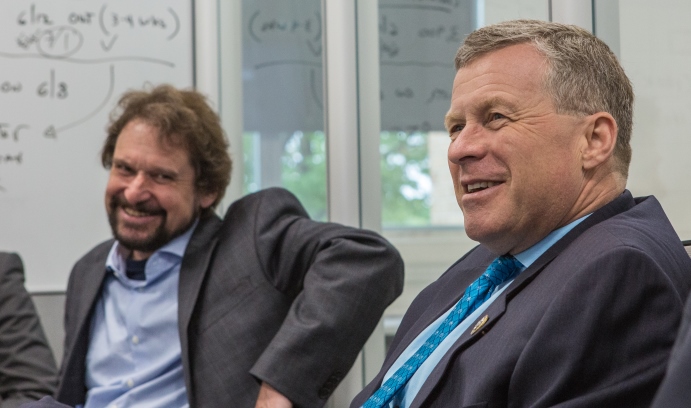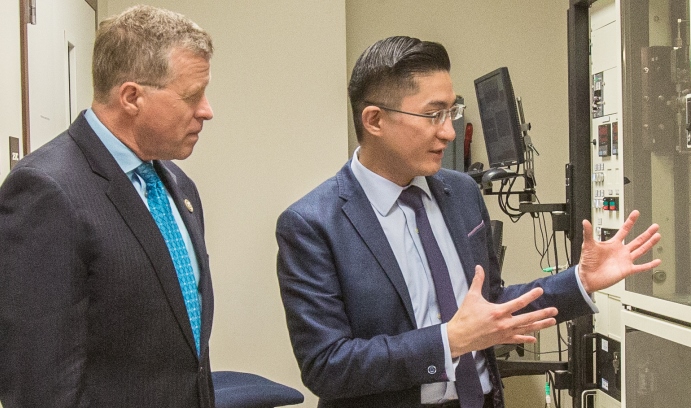A Congressman Visits the CPN

U.S. Rep. Charles W. Dent (right), with Volkmar Dierolf, physics department chair, said here last week that the research being done at Lehigh’s Center for Photonics and Nanoelectronics would have a lasting impact. (Photo by Christa Neu)
U.S. Rep. Charles W. Dent paid a visit on Friday, July 7, to Lehigh’s Center for Photonics and Nanoelectronics (CPN) and toured its Smith Family Laboratory for Optical Technologies.
Dent, a Republican who represents Pennsylvania’s 15th congressional district, spoke for 90 minutes with CPN faculty and representatives of the photonics industry in the Lehigh Valley.
The CPN was founded in 2014 as a merger between two other Lehigh research centers —the Center for Optical Technologies (COT), which focused on photonics research, and the Sherman Fairchild Center for Solid-State Studies, which concentrated on electronics and solid-state devices.
The CPN’s 22 core faculty researchers and 11 affiliated faculty members have made advances in materials, devices, and integrated systems in the fields of photonics and nanoelectronics. These key innovations have impacted the areas of energy efficiency and renewable energy, biosensors and biomedicine, semiconductors and solid-state devices, lasers and lighting (including LEDs), and laser-induced functional engineering.
The CPN has received major support from federal agencies such as the National Science Foundation, the Department of Defense, the Department of Energy, and the National Institutes of Health. During the past decade, the COT’s activities were closely tied with the photonics industry in the Lehigh Valley, including Infinera, Cisco, IQE, Broadcom and other local startups. The CPN is exploring ways to strengthen its connection with industry, specifically by better placement of its students into these companies and by nurturing entrepreneurial activities with these partners.
Dent, who earned a master’s degree in public administration from Lehigh in 1993, said he was greatly impressed by the work being done at the CPN.
“The Lehigh Valley was known for many years as the site of the massively large industrial processes required for making steel,” he said. “Now it is at the forefront of technologies that operate at scales often invisible to the human eye. Yet the research being done at the CPN will likely impact the world as profoundly as the steel made here once did.”
Nelson Tansu, the Daniel E. ’39 and Patricia M. Smith Endowed Chair Professor and Director of the CPN, said the faculty researchers in the center receive approximately $4 million in annual funding. Leveraging the vertically-integrated faculty and facilities within CPN, these faculty research projects have led to impactful activities in the areas of III-nitride semiconductors, 2D layered materials, terahertz sensors, optical coherence tomography, functional glass photonics and others.
Since 2005, said Tansu, 140 Lehigh students have received Ph.D.s working in photonics-themed disciplines within the center. Many now hold positions of technical leadership with top academic institutions and industrial companies.
“The CPN, like the COT and the Sherman Fairchild Center before it, has drawn highly talented students and faculty members to Lehigh University and the Lehigh Valley,” Tansu said. “We owe much of our success to the consistent support we have received from the federal government, the state of Pennsylvania and our industrial partners.”
In recent years, said Tansu, the CPN has widened the scope of its research.
While the COT emphasized the application of photonics to communications, he said, the CPN has expanded its interests to include the fields of health science, biomedicine, energy, electrical power devices and pharmaceuticals. “CPN tries to bring its broad expertise in integrated technologies to address big ideas, which have tremendous societal impact,” Tansu said.
In addition to Tansu, the meeting with Dent was attended by Volkmar Dierolf, chair of the department of physics; Jonathan J. Wierer, associate professor of electrical and computer engineering; and Sushil Kumar, associate professor of electrical and computer engineering. All are core faculty members in the CPN.
Also attending were William Michalerya, director of federal government engagement at Lehigh, and two recent Lehigh alumni: Sean P. Anderson ’04, an optical hardware engineer with Cisco Systems in Allentown, Pa., and Ravi S. Tummidi ’11 Ph.D., a photonics engineer with Cisco.
Two graduate students, Michael Erickson and Courtney Au-Yeung, joined Dent’s tour of the Smith Lab. Both are Ph.D. candidates in physics. Au-Yeung recently received a highly competitive NSF Graduate Research Fellowship that will support three years of her graduate study at Lehigh.
The CPN is a cross-college research center consisting of faculty from the P.C. Rossin College of Engineering and Applied Science (RCEAS) and the College of Arts and Science (CAS). Its faculty researchers are from the departments of electrical and computer engineering, physics, materials science and engineering, physics, chemistry, chemical engineering, and mechanical engineering and mechanics.
Story by Kurt Pfitzer
Posted on:





